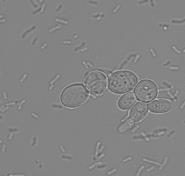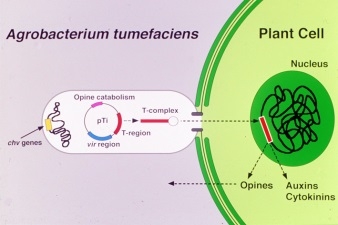Research project
The mechanism of Agrobacterium-mediated transformation of eukaryotic cells
We aim to unravel the molecular mechanisms involved in the transformation of eukaryotic cells by Agrobacterium.
- Duration
- 0
- Funding
-
 NWO
NWO
-
 China Scholarship Council
China Scholarship Council

We use the yeast Saccharomyces cerevisiae to investigate fundamental aspects of the Agrobacterium-mediated transformation of eukaryotic cells.
Agrobacterium tumefaciens
The soil bacterium Agrobacterium tumefaciens causes crown gall tumors in dicotyledonous plant species by genetic transformation. During the transformation process a piece of single–standed DNA (T-strand) is transferred into the host cells via a type IV secretion system. Besides the T-DNA, a set of virulence proteins is transferred into the host cells. These effector proteins aid in the transformation process.

Yeast as a model organism
Under laboratory conditions, Agrobacterium is also able to transform non-plant organisms, such as the yeast S. cerevisiae and fungi. Therefore, the many experimental tools developed for the model yeast S. cerevisiae can be used for studying basic aspects of the transformation process.
Biotechnology
Because of its ability to genetically transform eukaryotic cells, Agrobacterium is widely used in biotechnology to genetically modify plants and fungi.
Project
Currently we focus on visualization of protein translocation and the role of host factors in the transformation process.

